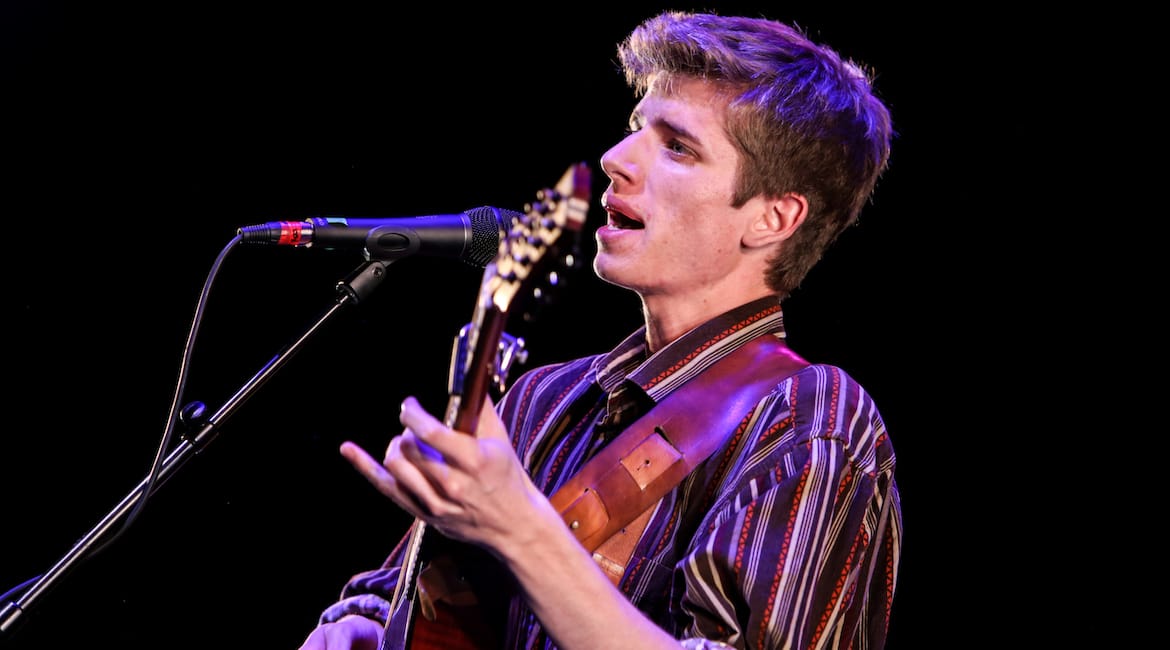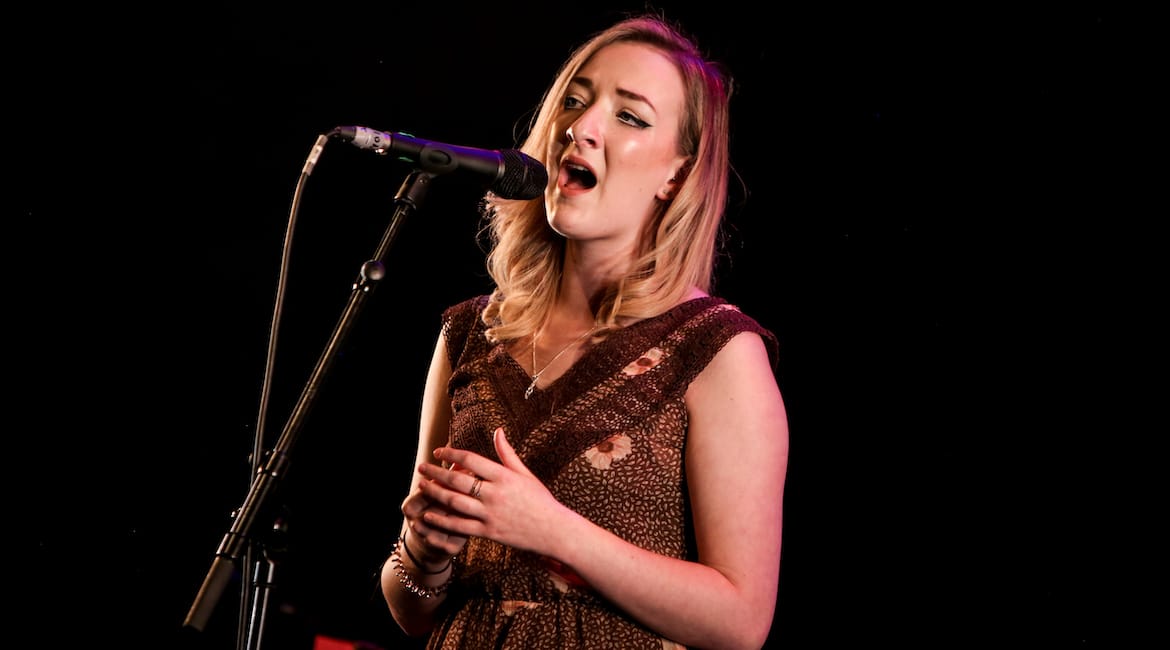Since moving into the city two years ago from outlying Bury, the Manchester Folk Festival has gone from strength to strength, with a real coup this year of encompassing the 20th BBC Radio 2 Folk Awards (reviewed here by Colin Irwin) and Young Folk Awards, and the industry event English Folk Expo again also running in tandem.

Five days of constant bustle and buzz in a range of venues began on a Tuesday evening, in what felt like an appropriate way, with a look at the next generation in the Young Folk Awards. Eight finalists, playing two songs or tunes each, exemplified the strength and diversity of young folk talent, including a superb version of Mary and the Soldier played on bouzouki by Jon Doran (pictured above) and a fascinating version of The Internationale, to a different tune, beautifully played on the piano by Iona Fyfe (pictured below). I didn’t envy the judges having to pick just one winner, but no-one could disagree with the announcement of Maddie Morris as the winner (main image) at the following night’s main Folk Awards after hearing her sing the traditional balled Barbara Allen and her own song Where Do I Go. The fitting inflections and ornamentation in her singing bely her relative experience and at times brought to mind no less a singer than Rioghnach Connolly, also a popular and deserving winner the following night of the Folk Singer of Year Award (a very popular decision with the locals).
Rowan Rheingans‘ solo show on Thursday, Dispatches on the Red Dress, was an intensely moving and quite unusual highlight, providing a running topic of conversation and consternation amongst those who missed it. Dispatches on the Red Dress is an unflinching story of history, fascism, waltzes, folk-song, birdsong, trauma, family and war, recalling her maternal grandparents, in particular, her grandmothers, experiences in 1940’s Germany. Brilliantly performed through spoken narrative – Rowan’s perfect intonation made it feel she was talking directly to you – and song with fiddles, banjo and guitar, live looping and pre-recorded sounds. You are left with a deep sense of family connectedness and memory, but also of hidden dark sides and also a necessity to resist fascist ideas in the present. The bloke sat next to me had seen it twice before and wasn’t sure he could bring himself to break the spell by watching anything else that evening.
Wherever two or more folksingers are gathered together there’s a good chance that you’ll not only get a healthy dose of integral musings on past and future political realities but also a rousing actual protest singer and Grace Petrie more than admirably fulfilled that slot in Manchester. Grace does exactly what she says upfront she’s going to do – that is sing feminist, lesbian, socialist protest songs, with a good smattering of swearing along the way. The audience, a mix of ‘know all the words’ fans and newbies of all types who were won over from the start, loved every minute of it. Grace has a brilliant knack of nailing the essence of a range of issues and nowhere better than in her introduction to Farewell to Welfare when she describes austerity as a political choice ‘to make the poor and vulnerable in society pay for the mistakes of capitalism’. Everyone in the room sang along raucously to the catchy Black Tie, dealing with gender stereotypes in an almost a pop-punk vein. Grace was exactly what we needed to remind us that we don’t have to take the current political nightmare lying down.
Come Friday, the temperature dropped a few degrees and the rain came to fuel those debateable stereotypes about my home city. The gigs may have been indoors but the weather seemed to dampen some performers and their audiences spirits a little. Poor sound initially made it difficult for Marry Waterson & Emily Barker. Things fell into place with a stirring version of Mike Waterson’s Bright Phoebus, A Window To Other Ways, the particularly Lal Waterson sounding title track from their excellent recent album, and the bouncy Little Hits of Dopamine, also from the album. They finished on a real high with an un-miked, resonant acapella version of Lal Waterson’s Some Old Salty, with full crowd participation. Sam Kelly & the Lost Boys and their audience struggled to get into full gear. Sam is obviously used to feeding off audience reactions, and an early muted response to his reference to the band recording a new album seemed to fix a gap between the seated audience and band that was never quite fully bridged. Being the excellent musicians that they are, they still pulled off great versions of The Bonny Lass o’Fyvie and The Greenland Whale and there was a warm response when Sam talked in a heartfelt way about being inspired by his Irish grandfather. Perhaps the brightest spot of the evening came in the form of a too-short solo set from Brìghde Chaimbeul, previous winner, in 2016, of the BBC Radio 2 Young Folk Award, and winner two nights previously of this year’s BBC Radio 2 Folk Horizon Award. Brìghde from the Isle of Skye is disarmingly unassuming, mostly simply telling about where she got tunes from, with just a few added entertaining anecdotes, and saving her energy and focus for her remarkable playing on the smallpipes. Her music really is unlike anything else you’re likely to hear anytime soon, transfixing the audience with a beguiling juxtaposition between her young age and astonishing playing of ancient-sounding music, not just from Scotland but also from Ireland and Eastern Europe. Brìghde sways gently through most tunes, immersing her whole being in the sound, transporting those of us fortunate enough to be listening far away from a wet, chilly Manchester.
Phoebus did the right thing on Saturday, bringing bright, clear spells, which was handy as the Festival organisers had thrown in a bunch of anarchic street theatre companies to entertain us in the great outdoors, right outside the main venue at Home (a theatre, film and art venue in the City Centre). Ramshacklicious presented The Band at the End of the World; dressed in punk marching band attire, they arrived in a burst of raucous brass-heavy music, driving a home-made, flaming battle-cart. Boom Bike BourrÉe played medieval hip-hop with hurdy-gurdy, beatboxing, accordion, and trombone. Festival goers – coats on – and passers-by all lapped up the fun, helped by the fire in the Ramshacklicious vehicle thing that staved off the worst of the cold for those close enough to benefit.
If anyone still thinks that the English Folk Dance and Song Society is still a stuffy, out of touch relic then the fact they are funding a residency for Ian Stephenson to explore using looping and projection technologies to create a new solo performance Modulate, which he debuted to fascinating effect on the Saturday of the Festival, emphatically proves otherwise. Looping adds a whole new meaning the idea of the multi-instrumentalist, offering a way of layering musical elements, primarily in Ian’s case very fine guitar, often both rhythm and the tune, and melodeon, with sprinklings of percussion, together with light projection responding to changes in the music. The icing on this cake was the beautiful, crystal clear singing of Kitty MacFarlane singing on songs from Canada’s Nightingale and Scotland’s The Easy Club.
For anyone used to the sound of O’Hooley and Tidow, Belinda O’Hooley’s solo – her and a piano – show was, as she warned at the start, very different. She treated us to a full run-through of her recent album Inversions, which as she explained is accurately titled because none of the tunes she played sounded very much like how we might have heard them previously. The performance was another on the family history theme and Belinda started by recounting being a young child ‘under the table’ as her dad, an Irishman from Co. Sligo, along with other men played traditional Irish tunes and songs whilst women provided food and drink. The patriarchy was similarly evident in her father’s wish that the music would be passed on to her brother, not to her – but she said: ‘I was listening’ – and when her father died a couple of years ago she decided it was time for her to play the tunes. The ‘inversion’ of familiar tunes included a slow, haunting version of Skibbereen and even stretched to retitling, as the Maid Behind The Bar became The Applecross Inn, named after a remote pub in Scotland. Mixed with an introductory spoken narrative, a few poems recited to piano accompaniment and the self-composed Cadair Idris, inspired by ascending the peak of that name by, Belinda’s playing was reflective, stark, yet full of warmth, and riveting from start to finish. Her dad, she said, wouldn’t have liked any of her versions of the tunes but we did.
No better way to end a packed, varied and restorative set of performances than with a blast of proper, down to earth traditional English folk songs and Nick Hart was just the man for the job. There is something uncomplicated and completely engaging about the way Nick sings. Even with a cold, you can hear every word and his delivery of every song – including Riding down To Portsmouth, The Two Sisters, Nick Hall and Flash Company – has a sense of definitiveness about it, be they ones you are familiar with or not. The River Don’t Run, written by a friend of Nick’s, told the long-forgotten story of the demolition of people’s houses to build St Pancras Station, at the same time covering over the river Fleet, and sounds like one of those songs that could easily be taken for a traditional song. Nick even managed to niftily include a song, The Mole Catcher, which includes a reference to Manchester in the first line, albeit a song from Norfolk. He makes folk song accessible, with no dumbing down whatsoever.
All told there was an impressive range of approaches to playing and singing on offer, for the most part by a mix of known and not so well-known acts from England or Scotland. The street theatre and gigs like a “pay what you can afford” concert with four emerging artists who have experienced homelessness illustrated the diversity and local community ethos the Festival is committed to. The tie-in with the BBC Radio 2 Folk Awards helped to raise the profile of the Festival bringing better national visibility which Festival Director David Agnew was optimistic could help to secure additional support next year from funding bodies. The Festival was an undoubted success and Manchester more than warrants a folk music showcase of this kind that continues to grow and develop.
Photo Credit: Phil Carter

